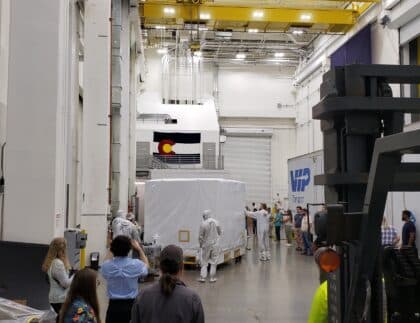
By Chris Bayee
The shift to remote and hybrid work schedules has changed many companies’ office space needs during the past five years, and this emerging trend isn’t expected to change anytime soon, according to several reports.
“This has been an area of growth for us this past year,” VIP Transport President Brittany Johnson said. “Many companies are downsizing and relocating to smaller spaces,” Johnson added.
How did the office world find itself in this spot?

Remote and Hybrid Work Increasing
According to the U.S. Bureau of Labor Statistics’ Monthly Labor Review from June 2024, the percentage of people working from home quadrupled from 2019 (7 percent) to 2023 (28 percent).
There are many reasons for this, led by cost and employees’ experiences working remotely. With the desire to continue remote work remaining strong, it’s hard to ignore the benefits for both employee and employer.
The Bureau of Labor Statistics report also found that small businesses’ needs, a key driver of office space demand, have dropped even more. Nearly 40 percent of self-employed workers now work from home, and 75 percent of business owners don’t rent space.
In addition, the pandemic changed perceptions about how viable and effective work from home could be. A study published in the Journal of Economic Perspectives in the fall of 2023 revealed that many workers were pleasantly surprised by how productive they could be from home. When businesses witnessed production increases, combined with potential rent savings, the decision to downsize became easier.
Office space is one of a company’s three biggest work expenses. In highly competitive markets, any edge a business can gain for its bottom line is explored.
Is This Only the Tip of the Downsizing Iceberg?
Contrary to employer efforts to bring employees back to the office, the shift from in-person work to remote and hybrid options may only accelerate in the next few years.
CBRE, by far the largest U.S. commercial real estate firm, found during a 2023 survey that a majority of companies plan to downsize their office space from 2024-26. That was especially true of big employers (10,000 or more employees), 68 percent of which plan to reduce their office footprint. That might be optimistic. A survey from hybrid work platform Robin put the number at 75 percent of all businesses.
Business lender Clarify Capital reported that 16 percent of owners who lease space intend to decrease or eliminate those expenses in the next year, and 24 percent plan to in the next five years.
With such a bleak outlook from industry professionals and alarming statistical analysis, there is no question the downsizing trend is here to stay.
“Some sectors of commercial real estate remain strong, with R&D, Flex space, and data centers showing no signs of slowing down,” VIP Transport Director of Sales Nicholas Schossig said. “Workspace and retail have seen better days, and the outlook is unfavorable for like-in-kind businesses to step into the space.”
The CBRE survey also cited big companies’ desires to upgrade their workspaces. Thirty-two percent of companies said that will be a priority. The new approach will be quality over quantity.
“While some investors are anxiously waiting for a market shift back to utilization of their workplaces, others see this as an opportunity to make improvements and reinvent their floorplans to capture the trends and needs of today’s gig economy,” Schossig added. “As always, VIP is in a position to assist in any way needed.”

Office Space Won’t Vanish Completely
As ominous of a warning as these polls highlight, that doesn’t mean office space eventually will go away completely.
Several trends have emerged that point to the future of office space.
Hybrid environments utilize flex seating 90 percent of the time and thus require less space. That means a transition to more casual, open floorplan spaces and huddle rooms for team building. These address the needs for individual and creative group work while offering a culture less reliant on corporate structure. Businesses are banking on these more intimate and collaborative settings to expedite a return to in-person work, increase productivity and mark a shift back to the norm.
What is happening to the space with so many vacancies? Commercial real estate companies are seeing their rents, and in some cases property values, decrease. As a result, property management companies and ownership groups are searching for solutions. One of the most common outcomes in crowded cities is the spaces are being renovated into apartments.

Pivoting To New Demands Of Office Relocation Needs
All of the relocations and decommissioning of office spaces have meant the used office furniture market has exploded in the past five years. Where does it all go?
The Seattle Times reported some furniture is resold through avenues such as liquidators and office furniture distribution companies. Furniture resellers say they have three times the inventory of two or three years ago, and the quality of what they’re acquiring from shuttered offices is higher than ever.
The resale market has another component besides the high-end, according to the Times. Low-cost chairs and desks are in demand as well. They’re often snapped up by college students, who use them for a year and discard them.
In addition, Goodwill, Habitat For Humanity, and many charitable donation organizations have seen their inventories explode. Some of these organizations have even started to ship aboard, with unwanted inventory finding its way to countries such as Costa Rica, Brazil, China, India, and South Africa to name a few. This is due to a change in shipping markets and a desire to keep our landfills free of debris.
What happens to the rest? Some metal is recycled, and some aluminum and steel go to scrap yards. The rest — the Environmental Protection Agency estimates 17 billion pounds — ends up in landfills.
As an industry leader, VIP Transport was prepared to adapt to these changes, and as a result, its commercial moving business has grown significantly, making it an attractive option for companies undergoing office transitions. With dynamic solutions to manage all relocation and installation needs, VIP is well-positioned to tackle any size task your business requires.











